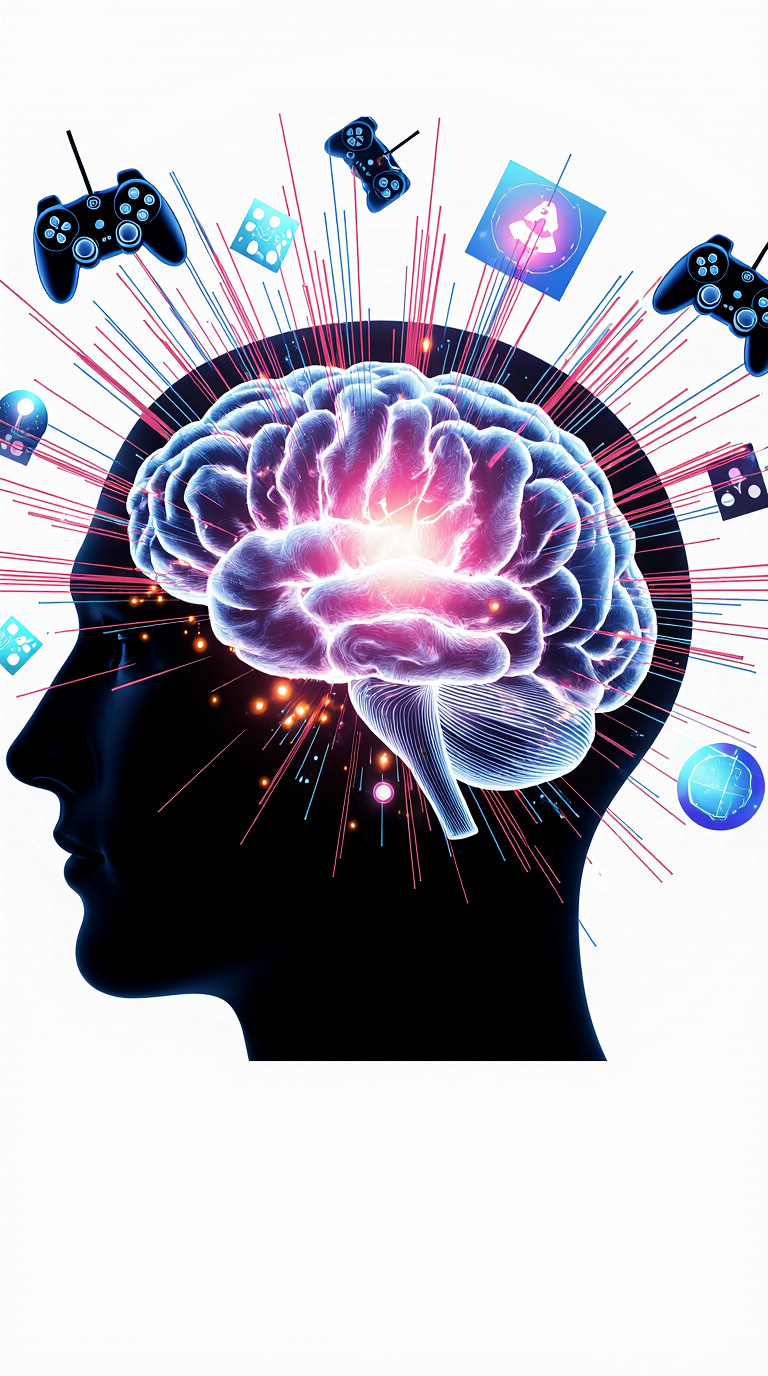Your Brain on Gaming
The Epic Neuroscience Behind Your High Scores!
Ever been in the zone, flawlessly dodging enemy attacks, nailing that headshot, or perfectly executing a complex combo in your favourite game? That feeling of lightning-fast reactions and laser focus isn't just about your gaming skill; it's a magnificent orchestral performance happening inside your skull – your brain at work!
Forget just levelling up your character; every time you play, you're secretly levelling up your most powerful gaming hardware: your own brain! Let's dive into the amazing neuroscience that makes you a gaming legend, and see how it links to what you're learning for your GCSEs.
The Brain: Your Ultimate Gaming Console
Think of your brain as the most advanced, organic supercomputer ever created. It's the central processing unit of your nervous system, a vast communication network that runs throughout your entire body. When you're gaming, your brain is working overtime, taking in tons of information, making split-second decisions, and sending commands faster than your internet connection.
Neurons: The Wires of Your Brain's Network
At the core of this supercomputer are billions of tiny specialised cells called neurons. Imagine them as the electrical wires of your brain. Each neuron has a cell body, dendrites (which receive signals), and an axon (which sends signals). When you see an enemy pop up on screen, your eyes (sensory organs) send electrical signals along chains of neurons to your brain. Fast, right?
Synapses & Neurotransmitters: The Game's Connection Points
Now, here's where it gets really interesting for GCSE students: neurons don't actually touch each other! There's a tiny gap between them called a synapse. How do signals jump this gap? With incredible chemical messengers called neurotransmitters!
When an electrical signal reaches the end of one neuron, it triggers the release of neurotransmitters into the synapse. These chemicals then bind to receptors on the next neuron, either exciting it to fire its own electrical signal or inhibiting it.
Dopamine: The "Reward" Neurotransmitter! Ever feel that rush of satisfaction when you beat a boss or collect rare loot? That's your brain releasing dopamine! It's part of your brain's reward system, making you feel good and encouraging you to repeat actions that led to that reward. This is why gaming can be so addictive and satisfying!
Adrenaline (and Noradrenaline): The "Fight or Flight" Neurotransmitter! More on adrenaline as a hormone later, but noradrenaline acts as a neurotransmitter too. When things get intense in a game – a sudden ambush, a crucial penalty shootout – your nervous system kicks into high gear, releasing these chemicals to sharpen your focus, increase your heart rate, and prepare you for rapid action.
Reflexes vs. Reactions: The Quick-Draw Duo
You just saw a red shell coming at you in Mario Kart and somehow swerved just in time. Was that a reflex? Not quite!
Reflexes are involuntary, rapid responses that don't involve conscious thought. Think of touching a hot plate and immediately pulling your hand away. The signal goes from your sensory neuron to a relay neuron in your spinal cord, directly to a motor neuron, bypassing the brain for speed. This is called a reflex arc.
Reactions, like swerving in a game, do involve your brain. You consciously process the visual information, decide on a course of action, and send signals to your muscles. While they're incredibly fast in experienced gamers, they're still brain-mediated decisions, not simple reflexes. Your brain is just super efficient at it!
Your Brain's Gaming Command Centre: Different Parts, Different Roles
Your brain isn't just one big blob; it's divided into specialised regions, each playing a crucial role in your gaming prowess:
Frontal Lobe (The Strategist 🧠): Located at the front of your brain, this is your CEO. It's responsible for planning, decision-making, problem-solving, and strategic thinking. In strategy games, RPGs, or even planning your next move in Chess (or Fortnite!), your frontal lobe is buzzing.
Parietal Lobe (The Spatial Navigator 🗺️): This lobe helps you understand spatial awareness and navigation. Whether you're judging distances to make a jump in a platformer, navigating a complex open-world map, or aiming a sniper rifle, your parietal lobe is crucial for understanding where things are in relation to you.
Occipital Lobe (The Visual Processor 👀): Located at the back of your head, this entire lobe is dedicated to processing visual information. Every pixel, colour, movement, and enemy on your screen is being interpreted here. A damaged occipital lobe could make gaming, well, impossible!
Temporal Lobe (The Sound & Memory Hub 👂🧠): Situated near your ears, the temporal lobe handles auditory processing (hearing footsteps, gunshots, dialogue) and plays a key role in memory. Remembering quest lines, character abilities, or enemy patterns relies heavily on this region.
Cerebellum (The Coordinator & Aim-Assist 🎯): Tucked under the back of your brain, the cerebellum is a master of coordination, balance, and fine motor skills. Every precise mouse movement, every perfectly timed button press, every fluid character movement in a game owes a lot to your cerebellum. It's like your brain's built-in aim assist and combo buffer!
Brain Stem & Limbic System (The Core Functions & Emotions ❤️🔥): While less directly involved in "strategy," the brain stem manages basic life functions (breathing, heart rate), keeping you alive while you game. The limbic system, deeper within, is where emotions and the reward system (hello, dopamine!) are processed, keeping you engaged and wanting more!
The Nervous System in Action: From Eye to Thumb!
Let's tie this all back to your GCSE Nervous System knowledge. When you see an enemy:
Sensory neurons in your eyes detect the visual information.
This signal travels to your brain (the Central Nervous System - CNS), specifically your occipital lobe for visual processing.
Your frontal lobe (strategy) and parietal lobe (spatial awareness) quickly process the threat and decide on a response.
The brain then sends signals down your spinal cord (part of the CNS).
These signals then pass to motor neurons in your Peripheral Nervous System (PNS).
The motor neurons activate the muscles in your fingers and thumb, pressing the attack button! All in milliseconds!
Hormonal Control: The Adrenaline Rush!
Beyond neurotransmitters, your body also uses hormones – chemical messengers transported in the blood – to influence your reactions. When you're in a high-stakes gaming moment, your adrenal glands (located above your kidneys) release adrenaline (also known as epinephrine) into your bloodstream.
Effects of Adrenaline: This hormone causes a surge of energy! Your heart rate increases, blood flow is redirected to your muscles, and your senses become heightened. This is what gives you that sudden burst of focus and speed in critical gaming moments. It's your body's "fight or flight" response, but you're channelling it into an epic gaming performance!
Beyond High Scores: What Gaming Can Teach Your Brain!
While your main goal might be to dominate the leaderboards, gaming actually provides an incredible workout for your brain. It can improve:
Problem-solving skills: Working through puzzles and challenges.
Hand-eye coordination: Precise movements and targeting.
Decision-making under pressure: Quick thinking in fast-paced scenarios.
Multitasking: Managing various in-game elements simultaneously.
Spatial reasoning: Understanding 3D environments.
So, the next time someone tells you gaming is a waste of time, you can confidently explain the incredible symphony of neurons, neurotransmitters, hormones, and brain regions all working together to help you achieve your high scores! You're not just playing a game; you're giving your brain a cutting-edge workout!
Keep gaming, keep learning, and good luck with those GCSEs!
Just wanted to let you be the first to know about my brand new Science Guy Learning Hub Limited Time Offer:
🚀 GCSE Science Sorted — For Just £10/month!
Struggling with Science? Join The Science Guy Learning Hub and get:
✅ Weekly GCSE video lessons
✅ Downloadable worksheets
✅ Live sessions & 24/7 Discord support
✅ All for just £10/month (limited-time launch offer!)
🎓 Learn better. Stress less. Join the community today:
👉 https://page.fo/thescienceguy
Join my YouTube Community for more FREE Hacks n Tips:
Plus my FREE Facebook Group:
Drop by my Website:
My TikTok Channel:
All of My Links in one place:
Thanks for reading The Science Guy!
Recommended FREE Reads:











